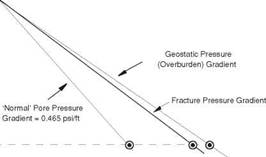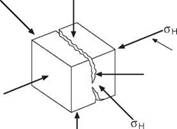 FORMATION FRACTuRE GRADIENT
FORMATION FRACTuRE GRADIENT
When planning the well, both the formation pore pressure and the formation fracture pressure for all of the formations to be penetrated must be estimated (Figure 19). The well operations can then be designed such that the pressures in the borehole will always lie between the formation pore pressure and the fracture pressure. If the pressure in the borehole falls below the pore pressure then an influx of formation fluids into the wellbore may occur. If the pressure in the borehole exceeds the fracture pressure then the formations will fracture and losses of drilling fluid will occur.
8.1 Mechanism of Formation Breakdown
The stress within a rock can be resolved into three principal stresses (Figure 20). A formation will fracture when the pressure in the borehole exceeds the least of the stresses within the rock structure. Normally, these fractures will propagate in a direction perpendicular to the least principal stress (Figure 20). The direction of the least principal stress in any particular region can be predicted by investigating the fault activity in the area (Figure 21).
|
|
|
|
|
Pressure, psi |
|
Figure 19 Pore Pressure, Fracture Pressure and Overburden Pressures and Gradients for a Particular Formation |
|
ol |
|
Depth, ft. |
To initiate a fracture in the wall of the borehole, the pressure in the borehole must be greater than the least principal stress in the formation. To propagate the fracture the pressure must be maintained at a level greater than the least principal stress.
|
|
|
Direction of Least Principal Stress. |
|
The Resulting Fracture in the Rocks |
Figure 20 Idealised view of the stresses acting on the block

